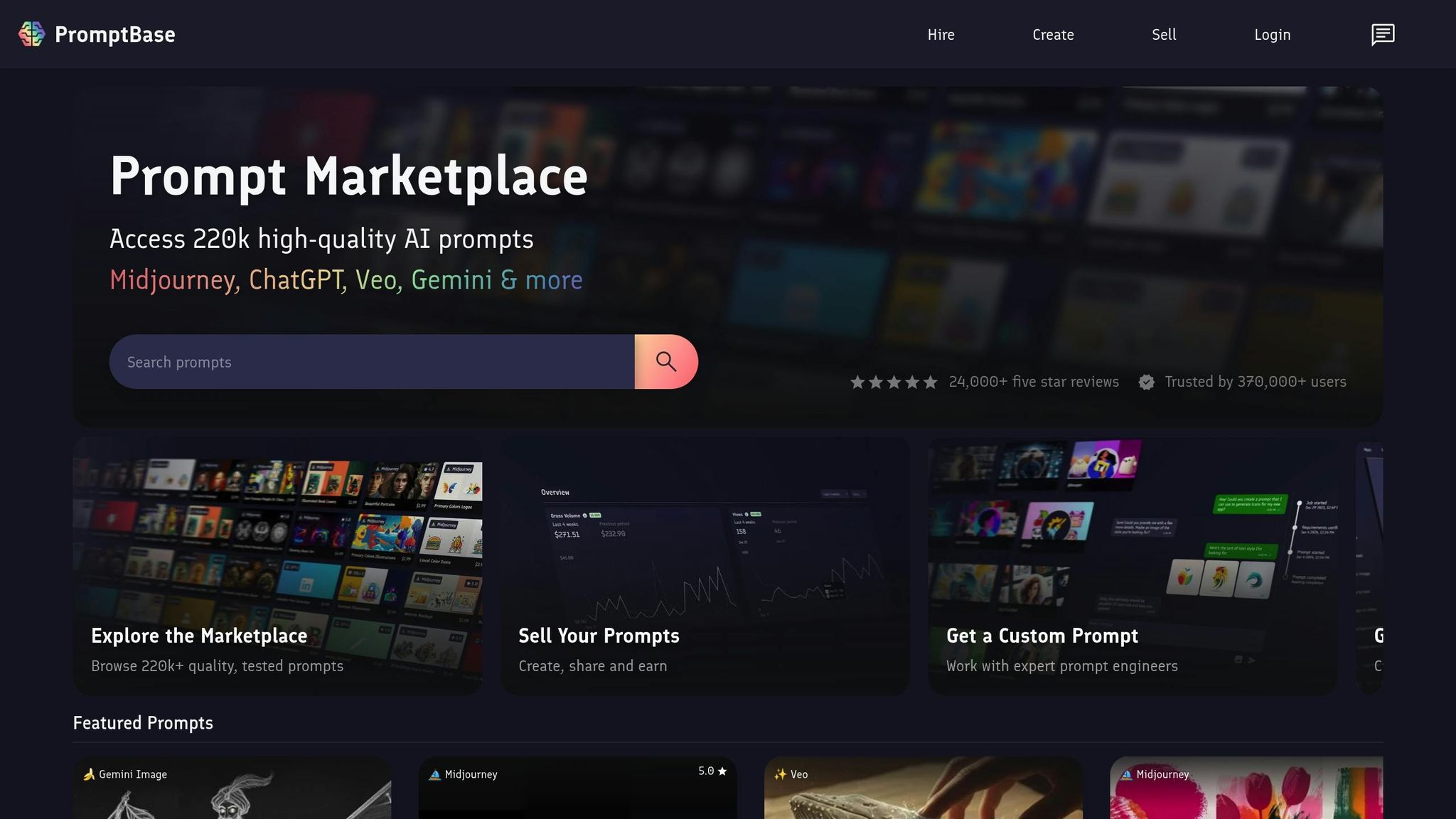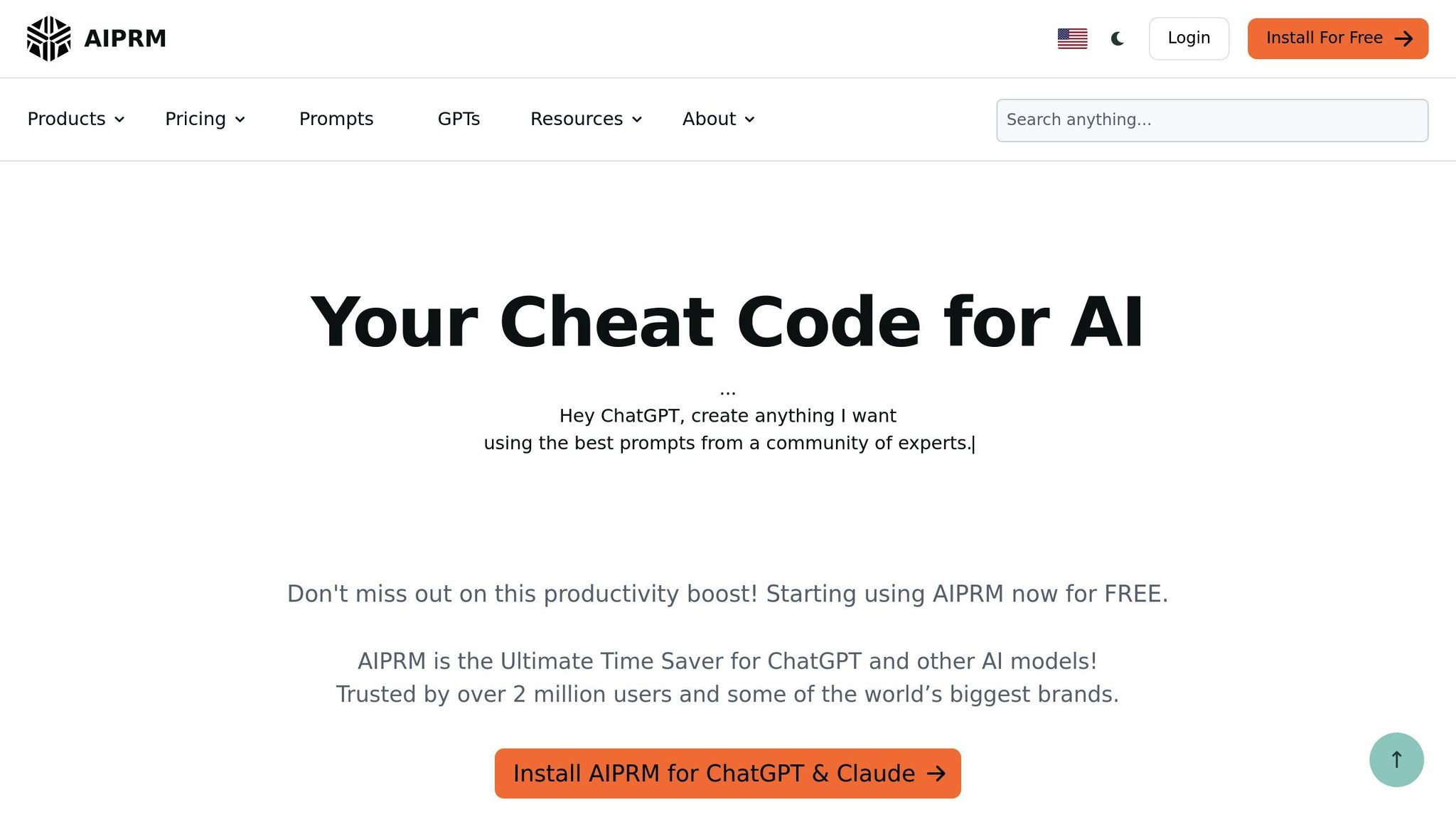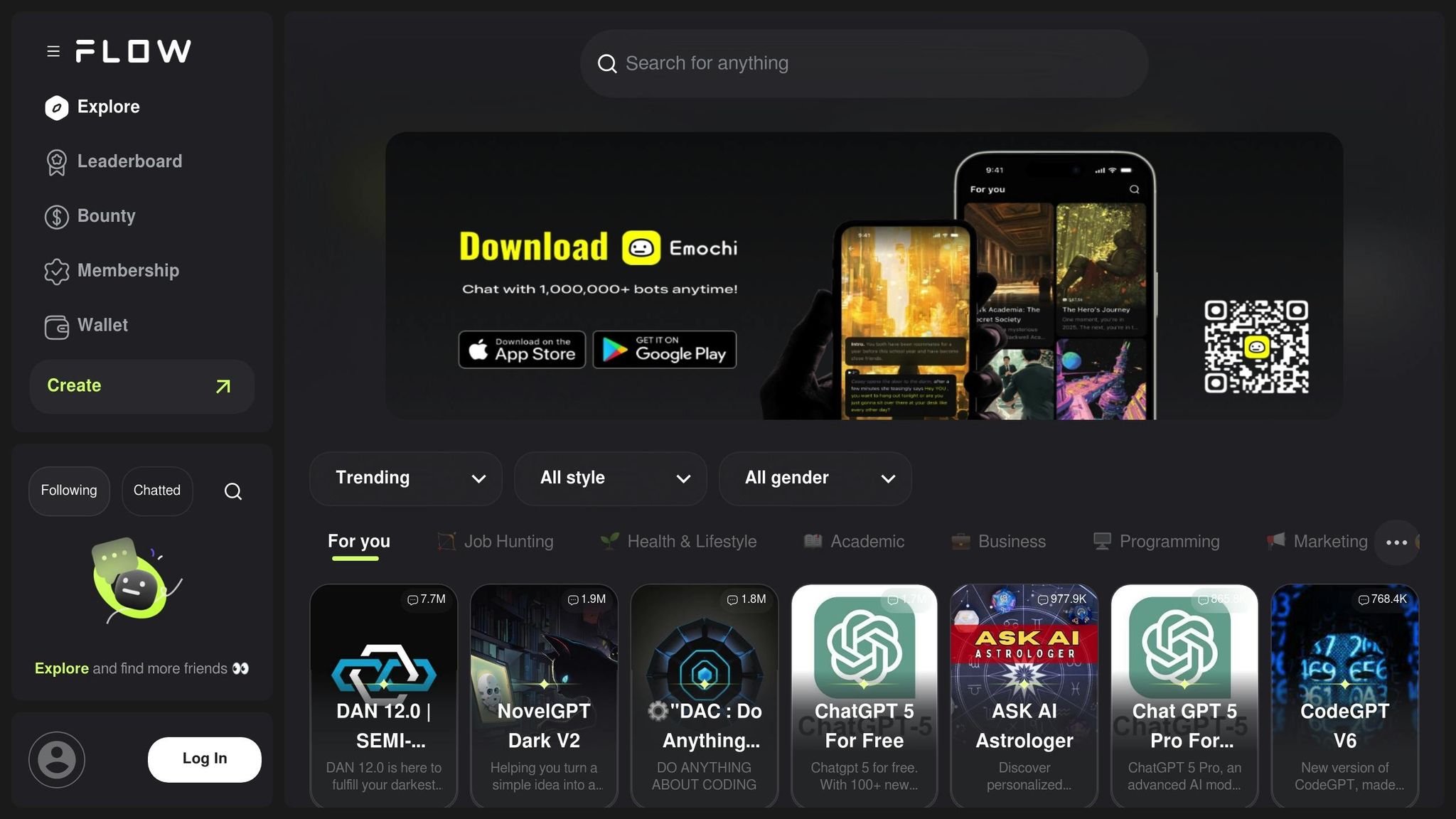Complete Buyer's Guide: AI Prompt Libraries Compared

AI prompt libraries simplify getting high-quality outputs from tools like ChatGPT, Claude, and Midjourney by offering pre-tested, ready-to-use prompts. These libraries save time for businesses and creators by eliminating the guesswork in prompt engineering. This guide compares five popular options based on pricing, features, and usability to help you choose the right one for your needs.
Key Takeaways:
- God of Prompt: Lifetime access with over 30,000 prompts organized by business function. Pricing starts at $37, with a comprehensive bundle for $150.
- PromptBase: Pay-per-prompt marketplace with prices ranging from $1.99 to $9.99. Ideal for occasional or specific needs.
- AIPRM: Browser extension for ChatGPT with a freemium model. Best for marketing and SEO applications.
- PromptHero: Freemium platform focused on image generation and creative prompts. Offers collaboration and analytics tools in paid tiers.
- FlowGPT: Community-driven platform with free and paid plans. Unique for its multi-model chat and workflow creation.
Quick Comparison:
| Platform | Best For | Pricing | Features | Drawbacks |
|---|---|---|---|---|
| God of Prompt | Comprehensive business use | $0 - $150 (lifetime access) | 30,000+ prompts, Notion-based library, lifetime updates, multi-AI compatibility | Requires familiarity with Notion |
| PromptBase | Specific or occasional needs | $1.99 - $9.99 per prompt | Pay-per-use, marketplace model, multi-model prompts | Quality varies; no lifetime updates |
| AIPRM | Marketing and SEO teams | Free - Paid subscriptions | ChatGPT browser extension, curated prompts, team collaboration tools | Limited creative use; browser-dependent |
| PromptHero | Visual and image generation | Free - $19.99/month | API access, analytics, collaboration tools, community-driven | Community quality inconsistency |
| FlowGPT | Experimenting with workflows | Free - $200/month | Multi-model chat, visual workflow creation, document upload | Open platform; quality moderation concerns |
Choose based on your specific goals, budget, and preferred workflow. For broad business needs, God of Prompt's Complete AI Bundle ($150) offers the most extensive resource. For occasional tasks, PromptBase provides cost-effective, pay-as-you-go access.
Top 7 Prompt Libraries for Unlimited Prompts
1. God of Prompt

God of Prompt provides a massive collection of over 30,000 prompts for platforms like ChatGPT, Claude, Midjourney, and Gemini. These prompts are thoughtfully grouped into specialized bundles, complete with practical guides to help users get the most out of them.
Pricing
God of Prompt uses a straightforward one-time payment model, avoiding the hassle of monthly subscriptions. Here’s a breakdown of their pricing tiers:
- Free Plan: $0 – Access to 1,000+ ChatGPT prompts, 100+ Midjourney prompts, and 10 Mega-Prompts.
- Writing Pack: $37 – Includes 200+ writing-focused Mega-Prompts with detailed guides.
- ChatGPT Bundle: $97 – Offers 2,000+ Mega-Prompts tailored for ChatGPT users.
- Midjourney Bundle: $67 – Features over 10,000 prompts for visual content creation.
- Complete AI Bundle: $150 – A comprehensive package with 30,000+ prompts across all categories.
All paid plans come with lifetime updates and a 7-day money-back guarantee, ensuring users get long-term value with no recurring fees.
Features
The platform organizes its prompts by business function, covering areas like marketing, finance, e-commerce, education, sales, productivity, and SEO. Each bundle includes clear how-to guides, making it easy for users to apply the prompts effectively.
Prompts are delivered through a dedicated Notion workspace, which acts as a searchable, well-organized database. Users also gain access to a custom GPTs toolkit and prompt engineering guides, which help them create personalized prompts when needed. The Complete AI Bundle goes a step further by offering unlimited custom prompt generation, allowing users to request tailored prompts for their specific needs. This makes God of Prompt particularly valuable for professionals and businesses.
Business Suitability
God of Prompt is a great resource for solopreneurs and small to medium-sized businesses looking for a comprehensive AI prompt solution. Its categorized structure allows professionals to quickly find prompts relevant to their industry. The lifetime access model is especially appealing for those who want to avoid subscription fees while still receiving regular updates. Plus, the free plan provides enough resources for small businesses to test the platform before committing to a paid tier. These features make it a practical choice for businesses of all sizes.
Access and Updates
The prompt library is regularly updated to stay current, and all content is accessible through a searchable Notion workspace. Beyond prompts, God of Prompt offers educational resources like industry newsletters and trend reports, keeping users informed about the latest developments in AI. Users can access everything immediately through the godofprompt.ai website, with lifetime updates included in all paid plans.
2. PromptBase

PromptBase operates on a pay-per-use model, setting it apart from other AI prompt libraries. It's essentially a marketplace where users can buy and sell individual AI prompts. Unlike subscription-based services, PromptBase lets you purchase only what you need, with no ongoing fees. The platform supports prompts for popular tools like ChatGPT, DALL-E, Midjourney, Stable Diffusion, and more.
Pricing
Prompt prices range from $1.99 to $9.99, and the platform also boasts over 2,300 free prompts. For businesses testing specific AI capabilities, this model can be a cost-effective alternative to expensive trial-and-error with APIs.
PromptBase uses a credit system for its AI apps, offering free starter credits and flexible options for one-time or subscription-based top-ups. This lets users scale their usage based on actual demand without overspending.
| Transaction Type | Cost to User | Revenue to Seller | Platform Fee |
|---|---|---|---|
| Standard Prompt Sale | $1.99 - $9.99 | 80% | 20% |
| Custom Job (Hire) | Varies | 90% | 10% |
| Referral Link Sale | Varies | 90% - 100% | 0% - 10% |
Features
As a marketplace, PromptBase hosts prompts created by individual sellers, which means quality can vary. Each prompt listing includes details like its intended use, sample outputs, and seller ratings, helping buyers make informed decisions. Available prompts span areas such as marketing copy, creative writing, image generation, and technical documentation.
The platform also offers AI apps that integrate seamlessly without requiring coding skills. This feature can save businesses time and effort, especially for those looking to boost engagement quickly. The credit system for these apps allows users to experiment with features before committing to larger purchases.
Business Suitability
PromptBase's pay-per-use pricing is ideal for businesses with occasional or specific prompt needs. However, some users have reported issues, including poor customer support, account bans, and delays in payouts. Despite these concerns, the platform holds a 4.2/5 rating on Trustpilot based on 1,345 reviews.
Access and Updates
Prompts are available for immediate use after purchase. Since they're sold by individual creators, update frequency depends on the seller. Unlike platforms that offer lifetime updates, buyers will need to purchase new versions if improved prompts are released by the same seller.
3. AIPRM

AIPRM takes a different approach to AI prompt libraries by offering its services through a browser extension. This extension enhances ChatGPT's functionality, making it a go-to tool for businesses and professionals. With a community of over 2,000,000 users and more than 4,500 public prompts, AIPRM has carved out a space for itself in the world of prompt sharing and management. Instead of functioning as a standalone marketplace, it focuses on simplifying AI prompts directly within ChatGPT.
Pricing
AIPRM operates on a freemium model with subscription tiers designed to meet different user needs. The free version is perfect for testing the platform, allowing users to save up to 2 private prompts and access 1 upcoming prompt without any cost.
Pricing is listed in US Dollars, excludes local sales taxes, and subscriptions are non-refundable. Users can combine plans to expand their feature limits, offering flexibility for those with more complex needs.
The tiered options cater to everyone - from individuals to advanced professionals and larger organizations. Higher plans unlock features like advanced prompt management, more customization options, and increased storage capacity, making it easy to scale based on specific requirements.
Features
The AIPRM browser extension integrates seamlessly with ChatGPT, streamlining prompt management. Its platform includes over 70,000 private prompts in addition to the public library, which has seen more than 3,000,000 top prompt usages - evidence of its active and engaged user base. Higher-tier subscriptions also include tools for team collaboration, adding another layer of functionality for businesses.
Business Suitability
For businesses heavily relying on ChatGPT, AIPRM offers a practical solution that fits right into existing workflows. With 59% of companies reporting savings through AI, AIPRM becomes an attractive option for organizations aiming to cut costs. The ability to combine multiple plans makes it even more adaptable for companies with diverse departmental needs.
Access and Updates
Once subscribed, users gain immediate access to AIPRM prompts via the browser extension. The platform's public prompt library is continuously updated, thanks to ongoing contributions from its active community.
sbb-itb-58f115e
4. PromptHero

PromptHero is a platform designed to make prompt discovery and management easier for AI developers, content creators, and marketers. It offers tools aimed at simplifying workflows and improving AI efficiency.
Pricing
PromptHero uses a freemium model, giving users a choice between a free plan with basic features and two paid options: Starter and PRO. These tiers are designed to fit different needs, making it easier for organizations to adjust their spending based on their goals and usage. Beyond just pricing, its range of features sets it apart in the world of prompt management.
Features
PromptHero offers a variety of tools to enhance AI workflows. Developers can take advantage of API access to integrate prompt functionality into their systems, while teams benefit from collaboration tools that make group work on prompts more efficient. Additionally, advanced analytics provide detailed insights into how prompts are performing, helping businesses fine-tune their strategies for better results.
Business Suitability
PromptHero is a versatile solution that works well for startups, small and medium-sized businesses, and large corporations. Its API integration is particularly appealing for companies looking to embed prompt functionality directly into their systems or customer-facing apps, ensuring smooth operations and adaptability to specific workflows.
5. FlowGPT

FlowGPT takes a unique approach to prompt engineering, offering a community-driven platform where users can explore AI prompts and craft lightweight AI apps, known as "Flows", across multiple models. This setup is especially appealing for those who enjoy experimenting with different AI systems while creating reusable workflows.
"FlowGPT has been steadily evolving from a prompt-sharing site into a community-driven marketplace of prompts and lightweight AI apps ('Flows') layered over multi-model chat." - Skywork AI
Pricing
FlowGPT uses a "pay as you grow" pricing model, charging users based on the number of AI-generated words instead of a flat monthly fee. This token-based system can be a flexible and cost-efficient option for users with varying needs.
Here’s a breakdown of the main pricing plans:
- Free Plan: Costs $0/month, includes 20,000 AI words, 5 Flow boards, and access to 100+ AI prompts.
- Lite Plan: Priced at $50/month, offers 100,000+ AI words and unlimited Flow boards.
- Pro Plan: Designed for heavy users at $200/month, providing 1,000,000+ AI words and unlimited Flow boards.
For advanced AI models and image generation, FlowGPT also uses virtual tokens called "Flux." Token packs are available at $49.99 for 500 tokens and $89.99 for 1,000 tokens. Be sure to check for the most current pricing before purchasing.
Features
FlowGPT's visual interface for ChatGPT makes content creation easier by organizing conversations and enabling users to map out AI-assisted workflows. Its multi-model chat function supports a variety of AI systems, including ChatGPT/GPT-class, Llama2, Claude, and Gemini, allowing users to compare results for different tasks.
The platform caters to both beginners and advanced users with its "Quick Mode" for simple usage and "Expert Mode" for deeper customization. Additionally, the document upload feature supports formats like PDFs, DOCX, TXT files, and even web links, making it easier to extract insights and streamline research efforts.
These tools make FlowGPT particularly appealing for businesses and creative professionals looking to enhance productivity and simplify complex workflows.
Business Suitability
FlowGPT is a great fit for creators and marketers who need to quickly test and refine workflows. It’s especially useful for developing outlines, product descriptions, translations, and brainstorming ideas, significantly cutting down on experimentation time. Students and solo researchers can also benefit from its ability to synthesize and summarize information while leveraging the multi-model approach to evaluate different output styles.
However, the platform’s open, community-driven nature has earned it the nickname "Wild West" of GenAI apps in some tech circles. While this highlights its broad capabilities, businesses should remain mindful of potential moderation issues and evaluate the quality of prompts before using them in production.
Access and Updates
FlowGPT offers a rich marketplace of over 100 prompts to help users spark creativity and organize content effectively. The platform is regularly updated with new features to stay aligned with the latest AI advancements. Active community forums provide a space for feedback and discussions, helping users stay informed about upcoming updates.
That said, businesses should carefully review prompts before implementation and confirm data policies related to training, retention, and export with their legal and security teams to ensure compliance and data safety.
Pros and Cons Summary
Each platform brings its own strengths and weaknesses to the table. By understanding these trade-offs, you can make a decision that aligns with your needs and budget.
| Platform | Pros | Cons |
|---|---|---|
| God of Prompt | • Extensive library: Over 30,000 AI prompts across multiple platforms • Lifetime updates: Ongoing access to new content • Well-organized: Prompts categorized for business, marketing, and SEO • Multi-AI support: Designed for ChatGPT, Claude, Midjourney, and Gemini • Refund policy: 7-day money-back guarantee • Flexible pricing: Options from $37 to $150 |
• Steep learning curve: Beginners might find the collection overwhelming • Notion-based: Requires familiarity with the Notion interface • No earning potential: Lacks a commission model for prompt sales |
| PromptBase | • High-quality prompts: Focused on business and commercial use • Performance tracking: Includes analytics tools • Multi-model compatibility: Works with ChatGPT, GPT-4, DALL-E, Midjourney, and Stable Diffusion • Transparent pricing: Clear cost structure |
• Commission fees: 20% fee reduces seller earnings • Higher costs: Premium pricing reflects quality • Limited free content: Most valuable prompts require payment |
| AIPRM | • Seamless integration: Browser extension works directly with ChatGPT • Marketing focus: Tailored for SEO and business applications • Curated prompt library • Easy to set up: Quick installation process • Practical results: Reliable for business use |
• Limited creativity: Geared more towards business than experimental use • Browser-dependent: Requires extension installation • Narrow focus: Less suitable for diverse creative needs |
| PromptHero | • Visual focus: Ideal for image generation prompts • Community engagement: Offers social features for learning • Free access: Millions of prompts available at no cost • Creative customization: Strong control over styles • Career tools: Includes a job board for prompt engineers |
• Pro plan required: Analytics and collaboration tools cost $19.99/month • Creative-centric: Less suited for business applications • Quality variation: Community-driven content can be inconsistent |
| FlowGPT | • Community-driven: Wide range of user-generated prompts • Free access • Versatile: Fits both hobbyists and professionals |
• Inconsistent quality: User contributions can vary significantly |
This summary highlights the key benefits and drawbacks of each platform, helping you weigh your options effectively. God of Prompt stands out for its vast resources and multi-AI compatibility, making it a great choice for those seeking a comprehensive solution. PromptBase is a strong contender for businesses that value high-quality, tested prompts and analytics. AIPRM is tailored for marketing professionals who need a seamless ChatGPT integration. PromptHero is perfect for visual creators who enjoy community-driven learning, while FlowGPT serves as a flexible, free-access option for exploring user-generated content.
Before committing, consider your budget, technical skills, and intended use. Many platforms offer free tiers or trials, giving you a chance to explore features without upfront costs. Use this summary as a guide to finding the platform that best meets your goals.
Final Recommendations
Pick the AI prompt library that aligns with your goals, budget, and level of technical expertise.
For broad business applications, the God of Prompt Complete AI Bundle is a standout option. Priced at $150, it includes access to over 30,000 AI prompts for tools like ChatGPT, Claude, Midjourney, and Gemini. Plus, it comes with lifetime updates and a 7-day money-back guarantee. This package is well-suited for enterprises looking for a wide-ranging solution.
For those on a tighter budget, the God of Prompt Writing Pack is available for $37. It offers 200+ mega-prompts tailored for freelancers and content marketers aiming to enhance productivity.
The key is to match your specific needs with what each package offers. If you're a business user seeking an all-in-one solution, the Complete AI Bundle is likely your best bet. For individuals or smaller-scale projects, the Writing Pack provides excellent value.
FAQs
How can I choose the right AI prompt library for my business?
To choose the right AI prompt library for your business, begin by pinpointing your specific goals and how you plan to use it - whether that's for marketing campaigns, boosting productivity, or educational purposes. The clearer your needs, the easier it will be to find a library that aligns with them.
Once you've outlined your requirements, take a close look at the pricing models. Make sure the cost fits within your budget while still providing solid value in terms of the library's quality and how well it meets your business objectives.
By carefully considering these factors, you'll be better equipped to select a library that meets your needs and delivers impactful results.
How do the pricing models of AI prompt libraries differ?
AI prompt libraries come with different pricing setups to suit a variety of needs. Some offer free plans that cover basic features, while others provide a one-time payment option that includes lifetime updates. Many platforms rely on subscription-based models or pay-as-you-go systems, letting you pay only for what you actually use. There are also tiered pricing options based on features or user count, giving you flexibility to pick a plan that aligns with your budget and objectives.
Can AI prompt libraries work with the tools and workflows my organization already uses?
The article dives into a comparison of features, pricing, and use cases of various AI prompt libraries. However, it doesn't cover how these libraries integrate with the tools or workflows already in place within your organization. If integration is a key concern, it's a good idea to check out the documentation or support materials provided by the specific library you're evaluating. These resources often offer insights into compatibility and setup.























